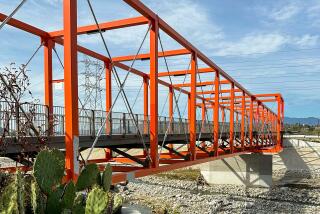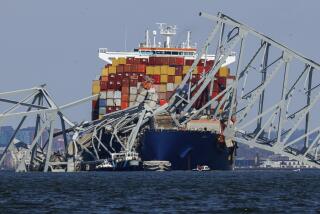Pride of Ferndale : Townsfolk Fight to Save 75-Year-Old Bridge
FERNDALE, Calif. — Aesthetics and tradition count for just about everything in this Victorian-style dairy town and art colony.
Caltrans learned that and more when it recommended studying the possibility of replacing Ferndale’s quaint, historical, cast-concrete bridge with a wider, safer--but, well, newfangled --span.
Ferndale, to put it mildly, was outraged.
“The Statue of Liberty was restored,” said Richard Farrington, Ferndale’s mayor. “They didn’t tear that down and build a new one.” Fernbridge--as the span is known--deserves no less, he added. And most townsfolk seem to agree.
Leading members of this village of 1,497 about 200 miles north of San Francisco mobilized and enlisted the support of power brokers all the way from the county seat to the state capital in an effort to protect their 75-year-old landmark from the destruction that neither flood nor earthquake could achieve.
Despite the support generated for the old bridge, the state Department of Transportation is not giving ground--at least not officially. Alternatives still being considered include a new bridge parallel to Fernbridge, a new span downstream, or a wide concrete top for the original Fernbridge that would retain the structure’s basic style.
Caltrans District Director Allen Wrenn also is trying to make clear that a renovation of Fernbridge also is an option--and always was, even if state engineers neglected to say so at first.
“There is a vast range of things being considered,” Wrenn said.
People in Ferndale, however, are a proud lot. They take pride, for example, in being the westernmost incorporated city in the 48 contiguous states. They take pride in their heritage as “Cream City,” where the country’s first motorized milk tank truck was introduced in 1914. And they take great pride in Fernbridge--and take umbrage at the idea of losing it.
“The people here, being a little conservative, they just don’t like having bureaucrats telling them what to do,” said John Gilliland, who last November threw a 75th “birthday party” for the bridge. More than 2,000 people showed up, and $5,000 was raised to prevent demolition.
“They feel (the bridge) has a close sentimental attachment to the town,” he said. “It changed the town so fundamentally, giving it access to the rest of the county, and people here haven’t forgotten.”
Nor have they forgotten that some of the newer bridges and overpasses built by the state in Humboldt County have failed to withstand the region’s earthquakes or floods. And no new span would have Fernbridge’s style or history.
“It’s a Romanesque design, built after the style in Europe, and it is very beautiful,” said Elizabeth Poston McHarry, editor and publisher of the weekly Ferndale Enterprise and a leading champion of the bridge.
The bridge also is one of the earliest examples of a cast concrete bridge, and has been cited by the American Society of Civil Engineers as the precursor to better-known spans of that time, such as the 1913 Colorado Street Bridge in Pasadena and the 1914 Cabrillo Bridge in San Diego.
Fernbridge was built in 1911 at a cost of $246,000--little more than 1% of what its replacement is estimated to cost. With its approach ramps, the bridge is 2,408 feet long. Its seven graceful arches each bound over 180 feet of the Eel River.
A then-generous 22.5 feet wide--big enough to accommodate the trolley line once proposed for it, with room to spare for milk wagons and pedestrians--it was considered a marvel of engineering in its time, historians said, and more than lived up to its reputation as “Queen of Bridges.”
Now, however, the queen is showing her age. Lichen clings to its railings; its concrete approach ramps need to be replaced; the bridge itself needs repaving; the dirt and gravel filling its hollow legs are leaking in spots.
These problems were uncovered during a routine annual inspection, prompting Caltrans engineers to question the span’s safety. Caltrans officials wrote to the Ferndale City Council in late 1985 recommending “that a new bridge be constructed as soon as possible.”
That news, along with more than a little editorial prodding by McHarry, set off a tornado of controversy.
“It may be old and narrow, but it means a lot to all of us,” wrote artist and gallery owner Larry Eifert in one angry missive to the Enterprise in the weeks after Caltrans’ plans were made public. “We feel we can put up with the slight inconveniences of an outdated bridge to be able to enter Ferndale’s valley over a classic feat of engineering instead of a piece of modern junk.”
Wrenn said his agency is not unmindful of the history behind Fernbridge and the sentimental attachment Ferndale residents have for it, but Caltrans has to balance those concerns with matters of safety and public convenience.
“I hope that we can retain the basic structure that’s there, because it is unique,” he said.
The restoration option received an added measure of credibility when sample testing of the wood pilings and structural concrete showed both to be still sound. Wrenn, however, said engineers still have some concerns.
“If a vehicle was to hit one of those railings, it is unlikely the railing would be able to contain it,” Wrenn said. “It might wind up in the river, or hanging over the edge or whatever.”
Ferndale residents, including McHarry, scoff at the “alleged shortcomings” of their bridge. They point to Fernbridge’s extraordinary safety record, which Wrenn acknowledges, and point out that its 11-foot-wide lanes are just as broad as those of some big-city freeways--and actually exceed the width of lanes on the Golden Gate Bridge.
“Maybe they ought to talk about tearing down the Golden Gate Bridge before they come to us about Fernbridge,” Farrington said.
“Most Ferndale people don’t give the size any worry,” Gilliland said. “I had a mobile home and once passed a logging truck going the other way without giving it a second thought.”
“So people have to slow down when they drive over the bridge--so what?” said 81-year-old Viola McBride, who still remembers the day Fernbridge opened to traffic--horse-drawn traffic. “We haven’t gotten that speedy here yet, I hope.”
More to Read
Sign up for Essential California
The most important California stories and recommendations in your inbox every morning.
You may occasionally receive promotional content from the Los Angeles Times.










